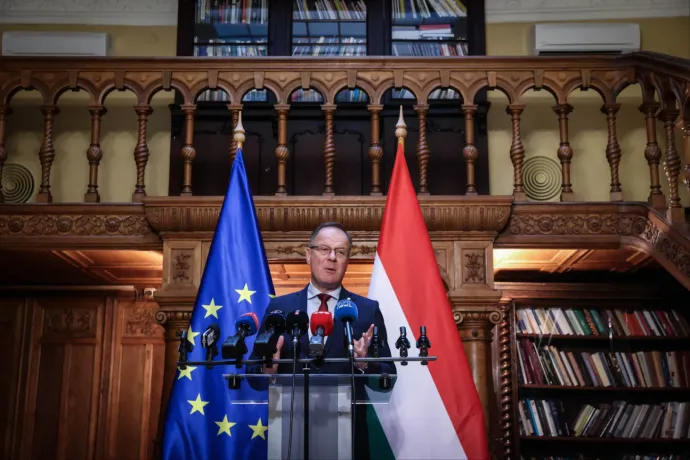
The meeting between Tibor Navracsics and the delegation of the European Parliament's Committee on Budgetary Control was a pragmatic one, seeking for mutual understanding, according to Hungarian Minister of Regional Development. During the three-day visit, the delegation was informed on issues related to the protection of the EU budget and the rule of law conditionality mechanism. They also familiarized themselves with the processes and monitoring arrangements for the operation of the recovery fund in Hungary, over and above the "regular" budget, and met with government officials, members of parliament and representatives of NGOs, among others.
The Minister for Regional Development is "moderately optimistic" about the likely conclusions, but doesn't believe the committee members have the best opinion.
He added that he hopes that they may have succeeded in gaining support for the long run, but only subsequent statements will show "how much credence they gave to our words". Navracsics said that members of the delegation had repeatedly complained that the public had accused them of being biased, but he felt that the delegation was at least as biased against the government and that some of the visiting politicians weren't well prepared and had not read the briefings sent to them in advance.
Navracsics is confident that the visit is not a threat to EU funds
As we have written in detail, the payment of a significant part of the EU funds available for Hungary since 2021 is being blocked by a complex set of conditions.
"I truly hope that this visit will not endanger the payment of these funds and that we managed to make the delegation's opinion more nuanced on several issues",
the minister said. (Although the EP is not directly involved in the procedures, the European Commission is represented in the delegation and plays a key role in unblocking the funds and negotiating the conditions for this.)
In response to accusations from several opposition sources, claiming that the government doesn't really want the EU funds, Navracsics said that "that would be quite a long act", as they have been negotiating for more than a year.
Erasmus and Horizon: 'Weeks or months' to go
The most pressing issue would be to settle the debate on trusts funds and trust-fund operated institutions, including universities. The Minister for Regional Development said this was not on the agenda at Wednesday's meeting, but he had just travelled to Brussels the day before to meet Budget Commissioner Johannes Hahn about the matter. Navracsics confirmed that the Hungarian position will be sent out next week, but that it will be an operative text (i.e. the draft text of the legislation, not just an informal proposal).
According to Tibor Navracsics, one point they are still discussing is, which administrative positions would exclude someone from participating on a board of trustees, but said that following Tuesday's consultation, the idea of aiming for somewhere between an open application and an invitation from existing members had come up. He commented that "it is a good question" whether this is a new condition, given that the European Commission's position has been evolving "organically".
The minister acknowledged that the Monday resignation of the European Commission's Education Commissioner, Marija Gabrijel (who resigned to try to form a government in her country) "doesn't make things easy when it comes to time". Greek Commissioner Margaritis Skinas will be given her areas of responsibility for the time being, so he will have to be contacted separately and will have to pick up the thread. The minister said that for a while, the government and the European Commission had been waiting for each other, "like snakes biting their own tails", and that the government had now finally sent an offer and expects the case to be closed "within weeks or months".
According to our sources, the European Commission expects it to take roughly two months from the adoption of a law to lifting the ban, with Johannes Hahn previously saying that a prepared draft law should be in place by the first half of May.
For the Erasmus+ mobility programme, contracts for next year's programme should be signed in July, and for Horizon Europe for Research and Development, the ban is already causing practical problems beginning in mid-May, as commitment deadlines for previously submitted proposals are beginning to expire.
The Hungarian government has set aside five billion forints to make up for the shortfall. As previously detailed in our longer article on Horizon Europe, in principle, new beneficiaries may be added to projects even as they are already underway, even by "promoting" an associated partner once the Hungarian government has already sealed the deal. This is most likely what Tibor Navracsics was referring to on Tuesday when – according to Szabad Európa – he said that foundation-run universities could be retroactively included in projects, but when speaking on Wednesday, he did not mention how automatic this possibility is in principle and what it would look like in practice.
For more quick, accurate and impartial news from and about Hungary, subscribe to the Telex English newsletter!